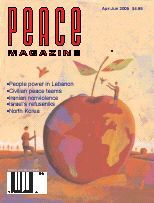
Peace Magazine Apr-Jun 2005, page 13. Some rights reserved.
Search for other articles by Carl Stieren here
The year was 1945. Hitler was ordering 16-year-olds into the military, and Hans Sinn of Hamburg was one of them. He found that one group in the induction centre was being sent to Denmark, where he knew there was enough food. Bad choice: it turned out to be an SS training camp, staffed by veteran sociopathic Nazis. Hans and his friends waited for their chance to escape. When they heard of Hitler's suicide, they made their move. Walking up - unarmed - to the guard at the gate, they told him: "You can stay here and die with them, or you can come with us and live." The guard threw down his gun and joined them. Over rivers, through bombed-out ruins, they made their way back to Hamburg.
Disappointed with postwar Germany's lost chances for disarmament and peace, Hans left for Canada in 1952, "just for two years." In 1959, Hans returned to Germany to oppose rearmament and spoke about a form of "Peace Corps," getting it onto the party platform of a small party, the Gesamtdeutsche Union. Back in Canada, on a walk for peace from Vancouver to Berlin, Hans stopped to speak in Montreal in January 1963. There he met a woman named Marian Bedoukian. She left her job and joined him on the march, and they were married in England. There Hans spoke at the Campaign for Nuclear Disarmament convention about forming a Peace Corps. Returning to Montreal afterward, he became co-editor of Sanity magazine, the publication of the Canadian Campaign for Nuclear Disarmament. In the 1960s, he was part of the Grindstone Island Training Institute in Nonviolence, including the famous "31 Hours" simulation of nonviolent resistance to an invasion. In 1970, after his sons Anthony and Nicholas were born, the family left for Brook Valley near Perth, Ontario. He joined a land co-operative where he built the house in which he and Marian have lived ever since.
In 1981, on Grindstone Island near Portland, Ontario, a group gathered to found Peace Brigades International, or PBI. Hans was one of the 11 founders, along with Murray Thomson of Ottawa. Hans became an International Committee member of PBI International and later chair of PBI-Canada. In 1984, he spoke to a hearing of the German Green Party in Bonn about a Peace Corps. In the early 1990s, he spoke in Berlin, at the Evangelical Academy in Berlin, which had developed its own proposal for a CPS. By 1999, Ziviler Friedensdienst had become the first fully operational Civilian Peace Service in the world.
In 2000, Hans again was a founder, this time of Nonviolent Peaceforce Canada (NPC), still keeping his active role in PBI. In the summer of 2004, NPC accepted Hans's plan to hold a Consultation on a Civilian Peace Service for Canada. And on February 10, 2005, he was speaking to Canadian parliamentarians about it.

Peace Magazine Apr-Jun 2005, page 13. Some rights reserved.
Search for other articles by Carl Stieren here